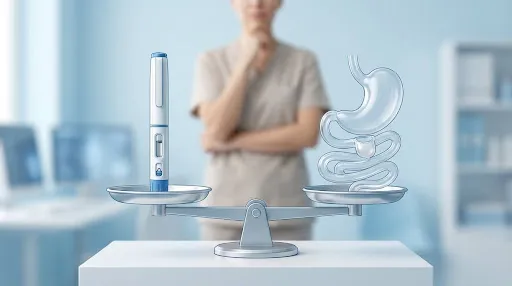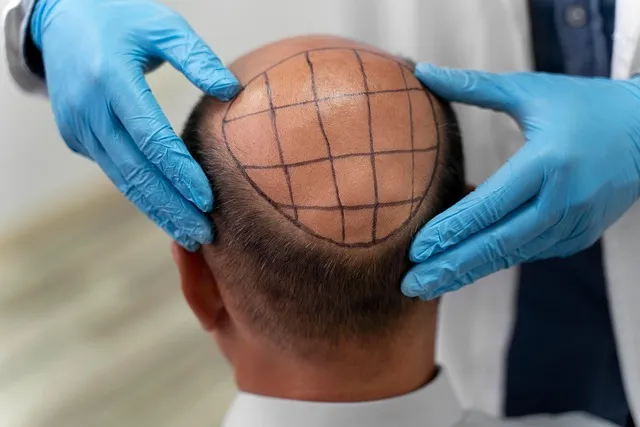Have you ever stared at your comb and wondered if the strands tangled in it will ever stop falling? Hair loss feels like a slow alarm that doesn’t stop. For women dealing with hormonal hair loss, every glance in the mirror feels different.
The stress adds to the shedding, and the cycle continues. This is why many women are now asking the right question, Is it good to use spironolactone for hair loss?
If you’ve been looking for a solution beyond shampoos and oils, spironolactone might be that turning point. But it’s not a magic pill. You need to understand what it does, how it works, and whether it’s the right choice for you. Let's break it down.
Are You Considering Spironolactone for Hair Loss?
Hair loss doesn’t just affect your scalp; it touches your confidence. And if you’ve tried serums, diets, oils, and still find yourself with a widening part, spironolactone might come into play. It’s not just another pill. It’s a prescription drug that targets the actual root, your hormones.
Spironolactone is a potassium-sparing diuretic. Doctors first used it for blood pressure issues. But soon, it was found to block androgens, the hormones that fuel hair thinning in women. This makes it one of the few hormonal hair loss treatment options that targets the source instead of just covering the symptoms.
Now, before we jump into excitement, remember this: Spironolactone for female pattern hair loss takes time. It’s not quick, and it’s not meant for all types of hair loss. Still, studies show that over 75% of women using this drug saw visible improvement.
Let’s break this down more.
Benefits of Taking Spironolactone Medicine for Hair Loss Treatment
Spironolactone is not a hair product; it’s a prescription. But its effect on hair is more than cosmetic. It works inside your body, where hormonal imbalances lead to hair thinning and slow shedding.
So, how does it work?
The drug blocks androgens (like testosterone) that affect hair follicles. These androgens can miniaturize the hair follicles, causing them to shrink and eventually stop producing hair. Spironolactone cuts off this supply.
Here's what it helps with:
-
Reduces DHT production (a major cause of female pattern baldness)
-
Lowers excessive oil (since androgens boost sebum)
-
Slows down active hair shedding
-
Promotes stronger regrowth from the follicle
What the Numbers Say:
In a controlled group of women dealing with androgenic alopecia, more than 75% saw hair density improve after 6 to 12 months of spironolactone usage.
Common Benefits:
-
Thicker hair shafts
-
Slower hair loss cycle
-
Scalp coverage improvement
-
Less hair fall during brushing or shower
But don’t expect miracles overnight. Most women start noticing results after the third or fourth month. The best treatments for hair loss in women always come with patience and consistency.
Is It Good to Use Spironolactone for Hair Loss?
Short answer: Yes, but not for everyone.
The longer answer needs nuance.
Spironolactone doesn’t just slow down hair loss; it corrects the hormone imbalance causing it. If your hair loss is due to PCOS, menopause, or hormonal disorders, then spironolactone can work better than topical treatments.
But here’s the catch.
It works best when taken with medical guidance. Also, combining spironolactone with minoxidil often delivers better results. This combo therapy supports both hormonal correction and follicle stimulation.
The impact?
-
Hair density improvement in 6-12 months
-
Less shedding within 2 months
-
Visible regrowth within 6–8 months
Side Effects of Spironolactone for Hair Loss Treatments
No drug is without risk.
And when we talk about spironolactone side effects hair loss patients might face, it’s necessary to know the list. Most symptoms are mild and fade with time. But others require urgent care.
Here’s what women have reported:
|
Common Side Effects |
Rare But Serious Side Effects |
|
Dizziness |
Muscle paralysis |
|
Fatigue |
Irregular heartbeat |
|
Headache |
GI bleeding |
|
Breast tenderness |
Severe dehydration |
|
Nausea and vomiting |
High potassium (Hyperkalemia) |
|
Menstrual irregularity |
Seizure or loss of consciousness |
Why It Happens:
Spironolactone alters sodium and potassium levels in your body. That’s how it works on your hormones. But this can cause a fluid or electrolyte imbalance. Always take it with enough water. Avoid mixing it with supplements unless cleared by your doctor.
And yes, blood pressure might drop, especially if you’re already on medications.
If you notice:
-
Weakness
-
Chest pain
-
Confusion
-
Trouble breathing
Get medical help right away.
When Should I Take Spironolactone for Hair Loss?
You need to get the spironolactone dosage for hair loss right.
Usually, women start with 25mg to 50mg per day. That’s the starting dose. Some reach 100-200mg based on how they respond. But this must only be done with regular monitoring.
Doctors often suggest taking it:
-
After meals
-
Or before bed, especially if nausea occurs
Pro Tip:
Start slow. Let your body adapt. If you feel dizzy, the dose may be too high. Check blood levels every few weeks for potassium, kidney function, and pressure.
Who Should Not Take It?
Spironolactone is considered safe for consumption, and it is an FDA-approved drug, also spironolactone is not for everyone.
Avoid it if you have:
-
Kidney disease
-
Liver disease
-
High potassium levels
-
Addison’s disease
-
Electrolyte imbalance
Also, don’t mix it with:
-
Potassium supplements
-
Other diuretics
-
Certain blood pressure meds
And yes, pregnant or breastfeeding women should talk to their doctor before taking it. Though spironolactone isn’t known to directly harm, it can pass into milk or affect hormone levels in the fetus.
Watch for These Dehydration Signs:
-
Dry mouth
-
Less urination
-
Dark urine
-
Dizziness
Tip: Drink plenty of fluids. And get tested before starting this medication.
Spironolactone Hair Loss Reviews: What Women Are Actually Saying
Reviews matter because they show what the stats don’t.
Here’s what many women are saying:
|
Time on Spironolactone |
Hair Health Result |
|
2–3 Months |
Reduced shedding, slight scalp improvement |
|
4–6 Months |
New hair growth, less breakage |
|
6–12 Months |
Fuller hairline, better scalp coverage |
|
Over 1 Year |
Maintenance, no major regrowth past a year |
Most reviews say it works, especially with minoxidil or biotin added to the routine. Some women stopped because of side effects like fatigue or weight fluctuations, but they were in the minority.
How Effective Is Spironolactone for Hair Regrowth?
It’s not a growth pill, it’s a blocker.
Still, spironolactone hair loss treatment can promote regrowth when the cause is hormonal. If the problem is related to overactive androgens, spironolactone can create a better environment for hair to grow back.
You can expect:
-
Slower loss after 6 weeks
-
Baby hairs after 3 months
-
Better texture in 6 months
-
Peak regrowth in 12–18 months
That’s if you’re consistent. And patient.
Pairing it with low-level laser therapy, nutrient-rich diets, or minoxidil foam can enhance the outcome.
Final Thoughts
Spironolactone isn’t a one-size-fits-all fix, but for the right candidate, it works. If your hair loss has a hormonal cause, this drug can reduce shedding, improve thickness, and regrow some of what you’ve lost. But it’s slow, and you need to stick with it.
Always speak to your doctor before starting. And monitor your health closely while on it.
In many cases, spironolactone for hair loss is not just a solution; it’s a relief. A silent answer to the question women have whispered for years in front of mirrors.
No more hiding the thinning scalp. You’ve got options.
أسئلة متكررة
Can I Use Spironolactone With Biotin or Iron Supplements?
Yes, but only if your doctor clears it. Both biotin and iron support hair growth, but they can affect how spironolactone is absorbed in your body. Don’t self-dose.
Is Spironolactone Better Than Minoxidil?
They work differently. Minoxidil boosts blood flow to hair follicles. Spironolactone blocks hormones. The best results come when you use both together, especially for hormonal hair loss.
Can Spironolactone Help With Hair Thinning After Menopause?
Yes. Hormonal changes after menopause trigger androgen rise. Spironolactone can reduce these hormone levels and slow thinning.
Should I Stop Spironolactone Once My Hair Grows Back?
No. Once you stop, the hormone levels may rebound. This can bring back shedding. Your doctor may recommend tapering the dose if needed.
Does Spironolactone Cause Facial Hair to Reduce Too?
Yes. Because it blocks androgens, it often reduces unwanted facial hair in women who experience both hair loss and hirsutism.

كُتب بواسطة







